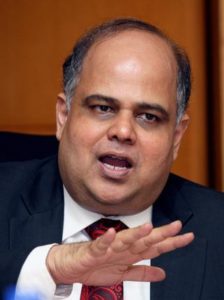
Arundhati Bhattacharya, Chairman, SBI: This year’s Budget has maintained logical continuity from the previous year’s Budget. As far as new announcements are concerned, most of them were unanticipated. Capping the cash transition limit to Rs 3 lakh, reduction in minimum cash donation to political parties to Rs 2000, and the novel idea of electoral bonds are in the surprise list. The capping of cash transactions will help banks reduce cash intensity. This in turn will help in freeing up manpower at branches for undertaking more value-added services. The thrust on digital economy was on expected lines. This will help banks expand their digital footprint as well as to meet the additional 10 lakh new POS terminals target by March 2017. The agriculture lending target has been substantially revised to Rs 10 lakh crore supported by further provisions for agriculture insurance. In this context, we believe it is important to create credit-absorption capacity rather than just enhance lending targets and this can be done by supporting infrastructure creation in rural areas which also the Budget aims at doing. The Draft Bill to curtail the menace of illicit deposit schemes is also a welcome move. And, affordable housing getting infrastructure status is positive for all stakeholders and is expected to give this sector a boost.

Chanda Kochhar, MD & CEO, ICICI Bank: The Budget has achieved the right balance between providing a growth impetus and maintaining fiscal prudence. It has comprehensively addressed all areas of socio-economic priority: farmers, poor and under-privileged sections of society, infrastructure development and strengthening of the financial sector. The Finance Minister has rightly prioritized investment in infrastructure and the rural economy, with a focus on inclusive growth and capacity building. The increase in capital spending and the proposals for investment in a range of areas from affordable housing to roads and railways would not only have a multiplier impact on other sectors of the economy but also enhance employment generation and make the growth inclusive. The thrust on digital transactions will increase the size of the formal economy and also make the payment systems more convenient and efficient. The tax measures are aimed at improving direct tax mobilization by broadening the tax base and improving the tax administration. The continuity in policy, with the over-arching objective of sustainable and inclusive growth underpinned by good governance, is very welcome.
 Melwyn Rego, MD & CEO, Bank of India: The Budget is pro-poor, pro-farmer, pro-small business and pro-infra while maintaining fiscal prudence and being pro-growth. It remains true to its dictum to ‘Transform, Energize and Clean’ India. A positive for the banking sector is the thrust accorded to evolving a swifter and effective resolution mechanism. Provision for NPAs to avail tax benefits has been raised. Overall, the Budget is pragmatic, focusses on tax compliance, improves the ease of doing business, brings about a transformative shift in governance and is expected to broad-base the India growth story.
Melwyn Rego, MD & CEO, Bank of India: The Budget is pro-poor, pro-farmer, pro-small business and pro-infra while maintaining fiscal prudence and being pro-growth. It remains true to its dictum to ‘Transform, Energize and Clean’ India. A positive for the banking sector is the thrust accorded to evolving a swifter and effective resolution mechanism. Provision for NPAs to avail tax benefits has been raised. Overall, the Budget is pragmatic, focusses on tax compliance, improves the ease of doing business, brings about a transformative shift in governance and is expected to broad-base the India growth story.
 Rajeev Rishi, Chairman, Indian Banks’ Association: Amidst huge expectations from the government, the Finance Minister has presented a Budget with a thrust on the rural sector and digitalization. In the midst of global uncertainties fueled by protectionism and market volatility, the focus is rightly on spiraling domestic consumption to aid overall growth. Hence, lot of thrust is given to rural sector on education, employment and rural infrastructure. Also, the assurance given by the Finance Minister to stick to the 3% fiscal deficit target in future shows the resolve of the government to maintain the fiscal discipline despite many challenges. As for the banking sector, recapitalization to the tune of Rs 10,000 crore for public sector banks, in the lines of Indradhanush scheme, is a positive and would provide them some additional resources for lending to aid growth. Listing and trading of security receipts issued by securitization companies is another good move. Infrastructure status to affordable housing sector would help increase the flow of funds to this segment in a big way and indirectly aid several industries associated with construction along with employment. Thrust on digitalization in several segments would help in the ease of doing business and reduce transaction costs.
Rajeev Rishi, Chairman, Indian Banks’ Association: Amidst huge expectations from the government, the Finance Minister has presented a Budget with a thrust on the rural sector and digitalization. In the midst of global uncertainties fueled by protectionism and market volatility, the focus is rightly on spiraling domestic consumption to aid overall growth. Hence, lot of thrust is given to rural sector on education, employment and rural infrastructure. Also, the assurance given by the Finance Minister to stick to the 3% fiscal deficit target in future shows the resolve of the government to maintain the fiscal discipline despite many challenges. As for the banking sector, recapitalization to the tune of Rs 10,000 crore for public sector banks, in the lines of Indradhanush scheme, is a positive and would provide them some additional resources for lending to aid growth. Listing and trading of security receipts issued by securitization companies is another good move. Infrastructure status to affordable housing sector would help increase the flow of funds to this segment in a big way and indirectly aid several industries associated with construction along with employment. Thrust on digitalization in several segments would help in the ease of doing business and reduce transaction costs.
 Ashwani Kumar, CMD, Dena Bank: Capital infusion of Rs 10,000 crore for recapitalization of PSU Banks will be a morale booster in scenarios where Banks are in dire need of capital for Credit growth and Basel III compliance. Further, the deductions allowed for NPA provisions made by banks have been increased up to 8.5% of the income which will act as a breather in supplementing profitability of banks.
Ashwani Kumar, CMD, Dena Bank: Capital infusion of Rs 10,000 crore for recapitalization of PSU Banks will be a morale booster in scenarios where Banks are in dire need of capital for Credit growth and Basel III compliance. Further, the deductions allowed for NPA provisions made by banks have been increased up to 8.5% of the income which will act as a breather in supplementing profitability of banks.

Chandra Sekhar Ghosh, MD, Bandhan Bank: The banking sector would get a fillip after doubling of Mudra loan, treatment of affordable housing as infrastructure and capex outlay increase by 25%. The Rs 10,000 crore recapitalization is not enough for the PSU banks with the level of bad loan situation.

G Srinivasan, CMD, New India Assurance: Indian farmers need risk mitigation mechanism in the form of insurance and PMFBY will compensate them whenever they suffer crop loss during natural disasters.”

Sanath Kumar, CMD, National Insurance: The increase in insurance cover under PMFBY will result in increase in premium by 15-20% by the industry in the next fiscal.
 Bhargav Dasgupta, MD & CEO, ICICI Lombard General Insurance: This government has done more to promote insurance as a risk mitigation tool and the decision to increase the coverage under the Pradhan Mantri Fasal Bima Yojana to cover 40% of crop area is a continuation of that approach. The budget aims at continuing with the government’s agenda of pursuing an inclusive and long-term development of the economy by focusing on the core enablers, including infrastructure, digitization, rural development, among others. New initiatives, such as a proposed model on contract farming are a welcome move.”
Bhargav Dasgupta, MD & CEO, ICICI Lombard General Insurance: This government has done more to promote insurance as a risk mitigation tool and the decision to increase the coverage under the Pradhan Mantri Fasal Bima Yojana to cover 40% of crop area is a continuation of that approach. The budget aims at continuing with the government’s agenda of pursuing an inclusive and long-term development of the economy by focusing on the core enablers, including infrastructure, digitization, rural development, among others. New initiatives, such as a proposed model on contract farming are a welcome move.”
 Amitabh Chaudhry, MD & CEO, HDFC Life Insurance: Overall, it’s a good budget for the economy which in turn will always have a positive impact on the insurance sector. Fiscal prudence and thrust on keeping inflation low will continue to have a beneficial impact for life insurance offerings. The slew of measures in the budget, especially the thrust on digital showcases the intent of the government to shift money to formal financial channels and life insurance is a positive – albeit over a longer time horizon. The proposal to abolish FIPB and liberalization of FDI signals that India remains open for business in a world rapidly shifting towards protectionism.
Amitabh Chaudhry, MD & CEO, HDFC Life Insurance: Overall, it’s a good budget for the economy which in turn will always have a positive impact on the insurance sector. Fiscal prudence and thrust on keeping inflation low will continue to have a beneficial impact for life insurance offerings. The slew of measures in the budget, especially the thrust on digital showcases the intent of the government to shift money to formal financial channels and life insurance is a positive – albeit over a longer time horizon. The proposal to abolish FIPB and liberalization of FDI signals that India remains open for business in a world rapidly shifting towards protectionism.
 Sameer Gupta, Tax Leader – Financial Services, EY India: The proposed amendment on increase in deduction available to Indian banks for provisions for bad and doubtful debt from 7.5% to 8.5% of adjusted total income and whereby non-scheduled co-operative banks are allowed to offer interest on sticky loans on receipt basis would certainly in addition to other measures introduced, help banking industry to strengthen their financial position.
Sameer Gupta, Tax Leader – Financial Services, EY India: The proposed amendment on increase in deduction available to Indian banks for provisions for bad and doubtful debt from 7.5% to 8.5% of adjusted total income and whereby non-scheduled co-operative banks are allowed to offer interest on sticky loans on receipt basis would certainly in addition to other measures introduced, help banking industry to strengthen their financial position.
 Nilesh Shah, MD, Kotak Mahindra AMC: For the financial sector, Rs 10,000-crore allocation towards the PSB recapitalization looks low.
Nilesh Shah, MD, Kotak Mahindra AMC: For the financial sector, Rs 10,000-crore allocation towards the PSB recapitalization looks low.
 Tomas Hrdlicka, CMO, Home Credit India: The Finance Minister presented a carefully detailed plan to improve people’s spending power and also focused on the need of small traders and farmers. It is heartening to note that the Finance Minister has offered the biggest tax break to the lowest salaried bracket giving them more money in hand. The push towards digitalization of payments and formalizing the credit market is a welcome step which will lead to more people coming under the legitimate financial system.
Tomas Hrdlicka, CMO, Home Credit India: The Finance Minister presented a carefully detailed plan to improve people’s spending power and also focused on the need of small traders and farmers. It is heartening to note that the Finance Minister has offered the biggest tax break to the lowest salaried bracket giving them more money in hand. The push towards digitalization of payments and formalizing the credit market is a welcome step which will lead to more people coming under the legitimate financial system.
 Suresh Ganapathy, Associate Director, Macquarie Capital Securities India: Overall, it’s a neutral budget. Low fiscal deficit and lack of any populist measures like the farm loan waiver turned out to be positive for the banking stocks. Lower deficit will also ensure that Reserve Bank of India has more space to cut rates. The only negative thing is lower capital infusion in public sector banks.
Suresh Ganapathy, Associate Director, Macquarie Capital Securities India: Overall, it’s a neutral budget. Low fiscal deficit and lack of any populist measures like the farm loan waiver turned out to be positive for the banking stocks. Lower deficit will also ensure that Reserve Bank of India has more space to cut rates. The only negative thing is lower capital infusion in public sector banks.
 Adhil Shetty, CEO & Co- founder, BankBazaar: The budget reiterates that the road to financial inclusion is through digital finance. As a Fintech company, this attitude is very encouraging to BankBazaar as well as the Fintech industry as a whole. From our perspective, the budget has two highlights: the push on infrastructure and the cap on cash transactions. On one hand, we have the Bharat Net project to bring high-speed broadband to gram panchayats to enable higher connectivity and access to banking services, and POS and Aadhar-based POS especially in rural areas to facilitate digital payments. On the other hand, we have a cap on cash transactions above Rs.3 lakh. There is also a Computer ERT for cyber security being planned. All these measures will enable a culture of digital finance and provide the required support and confidence to people to enter the formal banking system in the country and transact digitally. Even from the perspective of our customers, the budget brings more affordable housing coupled with subsidized loans, relaxed tax brackets, better benefits to senior citizens and pensioners. So, with these schemes, we foresee a significantly higher inclusion of lower income group within the banking system. In addition, he can share some inputs on tax – savings, insurance, investments, digital payments, paperless transactions.
Adhil Shetty, CEO & Co- founder, BankBazaar: The budget reiterates that the road to financial inclusion is through digital finance. As a Fintech company, this attitude is very encouraging to BankBazaar as well as the Fintech industry as a whole. From our perspective, the budget has two highlights: the push on infrastructure and the cap on cash transactions. On one hand, we have the Bharat Net project to bring high-speed broadband to gram panchayats to enable higher connectivity and access to banking services, and POS and Aadhar-based POS especially in rural areas to facilitate digital payments. On the other hand, we have a cap on cash transactions above Rs.3 lakh. There is also a Computer ERT for cyber security being planned. All these measures will enable a culture of digital finance and provide the required support and confidence to people to enter the formal banking system in the country and transact digitally. Even from the perspective of our customers, the budget brings more affordable housing coupled with subsidized loans, relaxed tax brackets, better benefits to senior citizens and pensioners. So, with these schemes, we foresee a significantly higher inclusion of lower income group within the banking system. In addition, he can share some inputs on tax – savings, insurance, investments, digital payments, paperless transactions.



